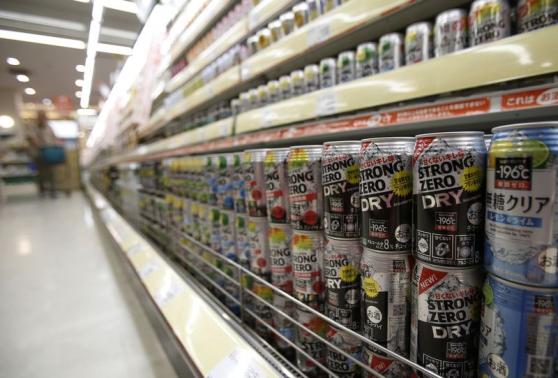 will release their longest-ever line-up of canned cocktails this summer as fizzy concoctions come to the fore in efforts to offset a decade of declining beer sales.
will release their longest-ever line-up of canned cocktails this summer as fizzy concoctions come to the fore in efforts to offset a decade of declining beer sales.Brewers such as Kirin Holdings Co Ltd have long tried to retain drinkers by making ever-cheaper, beer-like beverages. But changing tastes among Japan's youth have seen beer drinks giving up fridge space to highballs, white-wine spritzers and pineapple-flavored rum cocktails.
These so-called Ready-to-Drink (RTD) cocktails, like the cheapest beer-like drinks, fall into a low-tax category of Japan's complex liquor tax regime and can be priced far less than traditional tipples. This has helped them become the top introduction to alcohol among 20-somethings, according to a survey from brewer Suntory Holdings Ltd [SUNTH.UL].
In response to rising popularity, Suntory plans to release a record 23 canned cocktail labels from June to August versus 17 last year. Asahi Group Holdings launched a hot-seller in May, and Kirin announced a new range in June.
The increased choice means "this will be an important summer to further boost demand in RTDs," Suntory Managing Director Shinji Yamada said.
Demand is likely to be so strong that Suntory plans to raise output for its Strong Zero series of canned cocktails by a tenth this summer, and may increase production capacity for next summer, Yamada said.
READY TO DRINK
The Ready-to-Drink market has almost doubled since 2001 whereas traditional beer sales have nearly halved, showed data from Suntory.
Sales of beer have slimmed as once-universal drinking binges among office workers go out of fashion and Japan's increasingly health-conscious youth develop a taste for drinks containing fewer calories.
Brewers have tried to stem the decline by lowering prices. By reducing the malt content, brewers created beer-like drinks which could be priced less because they qualified for lower tax rates.
In Japan, beer is taxed based on malt content. The lowest-taxed beer-like drinks - dubbed "third beer" - are made with little malt or malt alternatives. In contrast, distilled spirits such as the cocktail ingredient vodka are taxed at higher rates based on alcohol content.
Due to a peculiarity in Japan's decades-old tax regime, however, Ready-to-Drink cocktails are taxed at the same rate as third beer, provided alcohol content does not exceed 9 percent, giving the drinks the appeal of both variety and price.
Suntory's Strong Zero vodka tonic, for instance, is priced at 152 yen ($1.49) for 350ml (12 fl oz) compared with 260 yen for its The Premium Malt's beer.
This year, Ready-to-Drink sales are likely to grow 3 percent to 13 million cases compared with a 1 percent decline in beer, according to Suntory. The brewer, which controls more than a third of the market, aims for RTD growth of 3.8 percent.
On the heels of Suntory is Kirin, which is looking to grow its Ready-to-Drink business by 8.4 percent this year with the help of its new Bitters line.
Late-comer Asahi stormed the market in May in the quickest-growing category of "strong" RTDs, where alcohol content is at least 8 percent. The brewer aims to ship 2.5 million cases of a highball made with distilled drink shochu by the close of 2014.
"We sold 450,000 cases by the end of May," an Asahi spokesman said. "So we're off to a good start."





